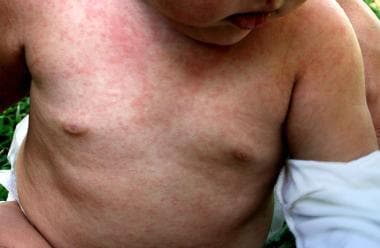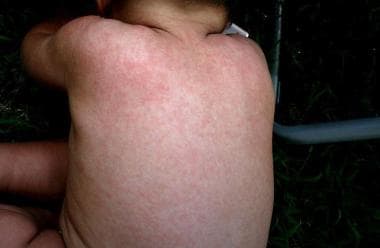History
The classic roseola infantum patient is a 9- to 12-month-old infant in previously good health and who has an abrupt onset of high fever (40°C), which lasts for 3 days with nonspecific complaints. A febrile seizure occurs in 15% of patients. Rapid defervescence is striking with the onset of a mild, pink, morbilliform exanthem.
In roseola infantum patients who are immunocompromised, the onset of symptoms is usually abrupt, with fever, malaise, and CNS and other organ system involvement.
Physical Examination
Despite the high fever, few clinical findings are observed early in the course of roseola infantum. The lack of upper respiratory tract infection is notable, and meningeal signs and encephalopathy are not present. Gastrointestinal symptoms, signs of electrolyte imbalance, or evidence of dehydration are rarely present.
A febrile seizure, with no residual findings, may have occurred.
After an abrupt loss of fever, the characteristic rash appears. The eruption is generalized and subtle. It is composed of either discrete, small, pale pink papules or a blanchable, maculopapular exanthem that is 1-5 mm in diameter. This rash may last 2 days.
The characteristic enanthem (Nagayama spots) consists of erythematous papules on the mucosa of the soft palate and the base of the uvula. The enanthem may be present on the fourth day in two thirds of patients with roseola.
See the images below.
Complications
In roseola infantum, complications are rare. Given that seroconversion is practically universal, finding any of the complications that have been reported in the gastrointestinal, central nervous, pulmonary, and hematopoietic systems is rare.
Children who have seizures with roseola are not expected to have further febrile or nonfebrile seizures.
-
Roseola infantum. Image courtesy of Wikimedia Commons.
-
Roseola infantum. Image courtesy of Wikimedia Commons.









